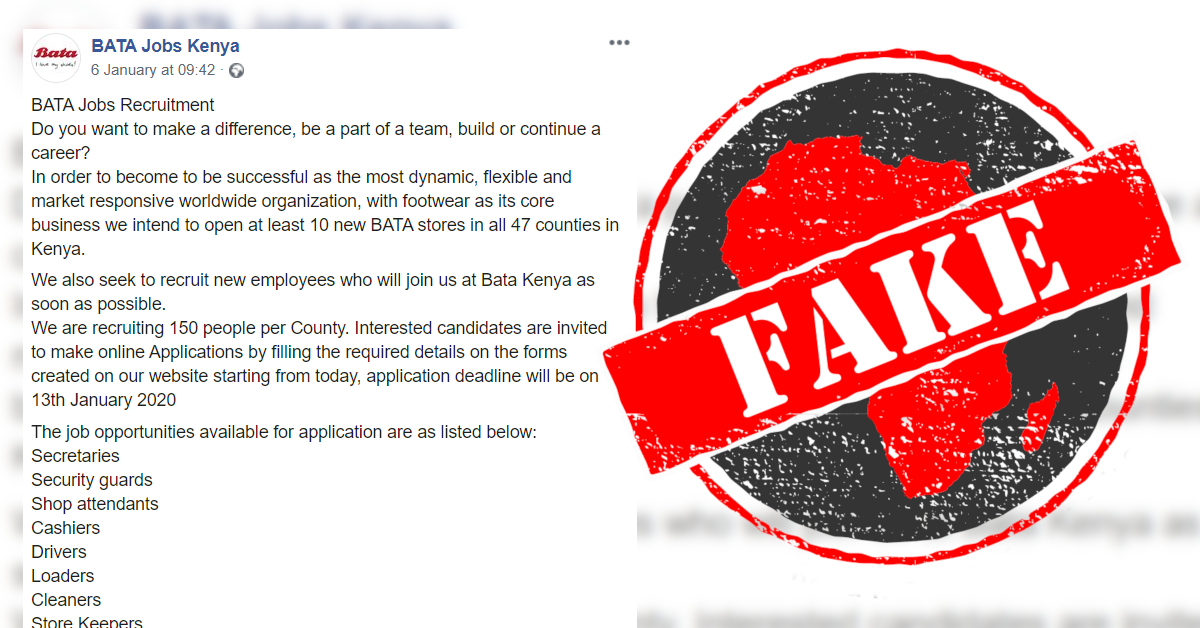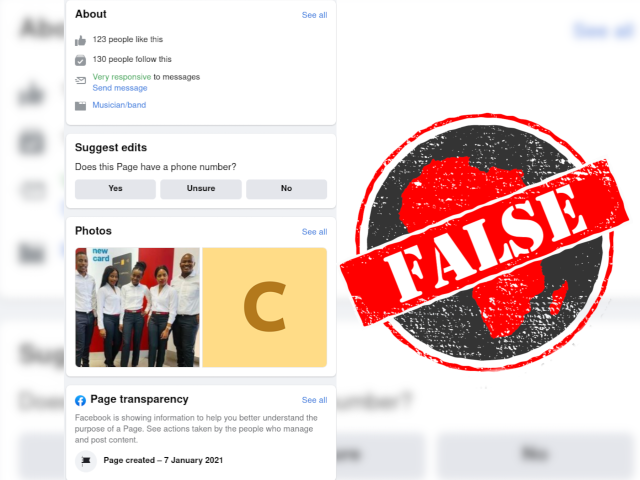A post on the Facebook page “BATA Jobs Kenya” claims Bata Shoe Kenya PLC, part of the multinational footwear and fashion accessory manufacturer and retailer Bata, is hiring.
The post says Bata plans to open at least 10 new stores in each of Kenya’s 47 counties, and is looking to hire 150 people per county.
“The job opportunities available for application are secretaries, security guards, shop attendants, cashiers, drivers, loaders, cleaners, store keepers and distributors,” it says.
It offers salaries of KSh30,000 a month, plus a monthly allowance of KSh5,000 for staff working in “hardship areas”.

People interested in the jobs are asked to click a link to apply. The link leads to a page on a poorly designed blog site titled “Jobs Kenya”.
Here job seekers are asked to fill in an application form – and pay a KSh350 registration fee. “ONLY APPLICANTS WHO HAVE PAID REGISTRATION FEE WILL BE CONSIDERED,” the page warns, in all caps.
Charging a “fee” for a job application is a common red flag signalling that a job advert is a scam.
Is the ad legit? Is Bata hiring on Facebook? We checked.
On 5 January 2020, a Twitter user asked Bata Shoe Kenya PLC this question: “@Batakenya Hi, are there job vacancies which I saw online posted by a group calling themselves Bata jobs Kenya?”
A few hours later, Bata Kenya responded: “These are fake.”
The shoe manufacturer then put out a notice on its official Twitter and Facebook handles warning people that the advert was fake.
“Please Beware of the Fake Jobs being advertised, we are currently not recruiting. When we are hiring, we run an advert in the newspaper and provide the details of the openings and the process of application. Be warned that BATA Jobs Kenya is not our page,” Bata Kenya said on Twitter, with a screenshot of the fake ad from Facebook attached.
A similar message was posted on Bata Kenya’s Facebook page. – Grace Gichuhi
The post says Bata plans to open at least 10 new stores in each of Kenya’s 47 counties, and is looking to hire 150 people per county.
“The job opportunities available for application are secretaries, security guards, shop attendants, cashiers, drivers, loaders, cleaners, store keepers and distributors,” it says.
It offers salaries of KSh30,000 a month, plus a monthly allowance of KSh5,000 for staff working in “hardship areas”.

KSh350 registration fee? Red flag for job scam
People interested in the jobs are asked to click a link to apply. The link leads to a page on a poorly designed blog site titled “Jobs Kenya”.
Here job seekers are asked to fill in an application form – and pay a KSh350 registration fee. “ONLY APPLICANTS WHO HAVE PAID REGISTRATION FEE WILL BE CONSIDERED,” the page warns, in all caps.
Charging a “fee” for a job application is a common red flag signalling that a job advert is a scam.
Is the ad legit? Is Bata hiring on Facebook? We checked.
‘BATA Jobs Kenya not our page’
On 5 January 2020, a Twitter user asked Bata Shoe Kenya PLC this question: “@Batakenya Hi, are there job vacancies which I saw online posted by a group calling themselves Bata jobs Kenya?”
A few hours later, Bata Kenya responded: “These are fake.”
The shoe manufacturer then put out a notice on its official Twitter and Facebook handles warning people that the advert was fake.
“Please Beware of the Fake Jobs being advertised, we are currently not recruiting. When we are hiring, we run an advert in the newspaper and provide the details of the openings and the process of application. Be warned that BATA Jobs Kenya is not our page,” Bata Kenya said on Twitter, with a screenshot of the fake ad from Facebook attached.
A similar message was posted on Bata Kenya’s Facebook page. – Grace Gichuhi
Republish our content for free
For publishers: what to do if your post is rated false
A fact-checker has rated your Facebook or Instagram post as “false”, “altered”, “partly false” or “missing context”. This could have serious consequences. What do you do?
Click on our guide for the steps you should follow.
Publishers guideAfrica Check teams up with Facebook
Africa Check is a partner in Meta's third-party fact-checking programme to help stop the spread of false information on social media.
The content we rate as “false” will be downgraded on Facebook and Instagram. This means fewer people will see it.
You can also help identify false information on Facebook. This guide explains how.



Add new comment